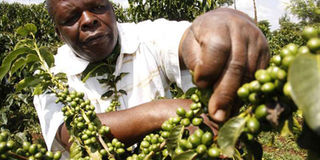Court suspends enforcement of coffee rules

Judah Kiprop Kuto tends to his coffee crop on July 21, 2016 in Kiptenden Village in Trans Nzoia County. A section of coffee industry stakeholders have said the new regulations ban pulping stations and cooperative societies from having liens over coffee growers. PHOTO | JARED NYATAYA | NATION MEDIA GROUP
What you need to know:
Justice Jairus Ngaah extended the orders preventing implementation and enforcement of the regulations pending determination of a case filed in court.
Mr Kimani said outlining cooperatives from borrowing or taking advances, the Agricultural cabinet secretary acted unreasonably by not provisioning for how societies will finance their operations.
The High Court in Nyeri has suspended the newly gazetted 2016 Coffee General Regulations pending the determination of a case filed in court.
Justice Jairus Ngaah on Thursday extended the orders preventing the adoption and enforcement of the directives.
Francis Ngunju Kimondo, Central Agri-Business Solutions and Technologies chairman, and Joseph Mbogo Githumbi, Mungaria Coffee Farmers Company chairman, have sued Agriculture and Livestock Cabinet Secretary Willy Bett Attorney-General Githu Muigai for gazetting the guidelines.
Through lawyer Muthui Kimani, they argued that the respondents published the directives and revoked the 2002 Coffee Rules without the requisite public participation from the industry's stakeholders.
They were legalised on June 16.
“The regulations violate coffee quality standards and threaten fundamental rights and freedoms not only of the petitioners, but also those of coffee farmers,” said Mr Kimani.
They said the rules would create confusion in the sector and consequently place farmers, producers and buyers at a disadvantaged position.
They added the regulations are threatening the entire coffee economy, saying it now "faced extinction".
Mr Kimani said coffee players would be denied permits to transport their parchments to millers.
Under the regulations, farmers are expected to market and sell their produce under a central depository unit.
The regulations have mandated the Agriculture, Fisheries and Food Authority (Affa) as the agency that will regulate the industry.
The measures also require every grower to register with the agency and county governments. They also ban pulping stations and cooperative societies from having liens over coffee growers.
Unlike before, the regulations provide that farmers receive direct payments for their coffee sales.
Mr Kimani said in outlawing cooperatives from borrowing or taking advances, the Cabinet secretary acted unreasonably by not laying out how societies would finance their operations.
He said the move would disable the working of coffee cooperative societies.
Moreover, he argued that the regulations would make working in the sector costly, and as a result discourage investors.
The case will be heard on September 1.
Editing by Philip Momanyi





